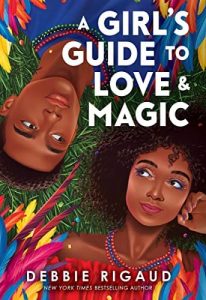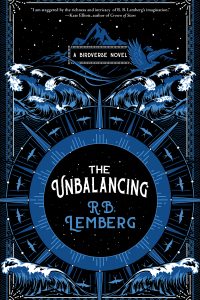Alex Brown Reviews A Girl’s Guide to Love & Magic by Debbie Rigaud
 A Girl’s Guide to Love & Magic, Debbie Rigaud (Scholastic Press 978-1-33868-174-1, $18.99, 288pp, hc) July 2022.
A Girl’s Guide to Love & Magic, Debbie Rigaud (Scholastic Press 978-1-33868-174-1, $18.99, 288pp, hc) July 2022.
Pro: today is Cicely Destin’s 15th birthday. It’s also the West Indian Day Parade, her favorite day of the year. It seems like all of Brooklyn has converted into a massive carnival, and Cicely wants to experience it all. Con: Cicely has to lie to her mom to sneak off with her estranged aunt. Mimose invited her niece to tag along to an interview with Cicely’s favorite rapper, but first a quick pit stop at a reading for a client. Things go spectacularly awry. The client tricks Mimose and she ends up possessed by a spirit Cicely believes is the lwa Erzuli. She gathers her bestie Renee and her crush Kwame, and the three teens set off on a wild ride across the big city to help free her aunt. A Girl’s Guide to Love & Magic by Debbie Rigaud is about growing up but not too fast, finding the courage to do what’s right instead of what’s easy, and discovering the power of community and heritage.
YA fantasies often edge past the 350+ page mark, and at least half the time when I’m reading one of those longer tomes I’m not convinced that the length is earned. Rigaud keeps her story focused and constantly on the move. It moves at a nice clip without dragging in the middle or staying at surface level. She also delivers another rarity; not only is it a shorter novel – under 300 pages – but the main characters are on the younger side of YA. Cicely turns 15 the day of the parade, and everything about the story feels perfectly tailored to that age.
Cicely may be a little on the naive side, but Rigaud captures that magical age where she’s young enough to still be full of wonder yet old enough to make thoughtful decisions. This isn’t just a book about a 15-year-old, it feels like a 15-year-old’s book. It speaks their language without talking down to them. Even the romantic subplot is aimed at younger teens. She gets her first kiss and first hand-holding and Cicely is content with keeping it in the sweet and chaste zone. Neither her nor her love interest are ready to (or even want to) move beyond that at this point, an experience we don’t often see in YA fiction. Sometimes a kiss can stay a kiss. It’s important for teens to hear that a kiss doesn’t have to be the start of something.
Although this book revolves around Haitian Vodou, Rigaud is careful with how she uses it. Without giving away the twist ending, the magic here is less about the lwa and more about rituals and ancestral connections. Cicely isn’t running around New York City with a wand or casting spells like an extra from Practical Magic. The novel feels grounded and accepting of different world views. It doesn’t other Vodou or its practitioners.
The story features spiritual possession, but it’s not framed in the traditional Western way where a ghost or deity colonizes a human body. In Haitian Vodou, lwa ride or mount their human hosts, allowing communication between the person and the lwa. I’m not part of the diaspora that engages with the various shades of Vodou, but I can feel in my heart and soul the difference in mentalities. It’s the difference between how Westerners often look at possession as, well, possession, as the more powerful taking something from the weak, as the exploitation of the human body’s resources and how practitioners of Vodou see it as a tool of communication and connection as well as an act of resistance. It was born out of the desire to keep our West African spiritual beliefs in the face of Catholic colonizers who wanted to abolish our cultures. There is power, then, in practicing Vodou, and especially in practicing it in New York City where the diaspora has gathered after centuries of colonialism have wreaked havoc on their New World homelands.
I adored everything about Debbie Rigaud’s A Girl’s Guide to Love & Magic, from the characters to the worldbuilding to the lush descriptions to the depth of the subtext. We see these characters untangle their complex feelings about being raised in the diaspora while having ties to your immediate relatives’ homeland but not your ancestors’ homeland. Seeing the way these teens navigate these choppy waters is crucial not just for other diasporic teens but for those who aren’t part of a diaspora at all. Funny, sweet, and extremely likable, this was a perfect read.
Alex Brown is a queer Black librarian and writer. They have written two books on the history of Napa County, California’s marginalized communities. They write about adult and young adult science fiction, fantasy, and horror as well as BIPOC history and librarianship. Diversity, equity, inclusion, and access set the foundation of all their work. Alex lives in Southern California with their pet rats and ever-increasing piles of books.








